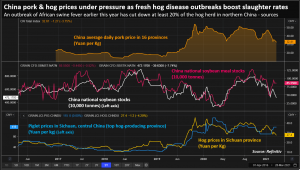A new 10% tariff on goods from around the world took effect Tuesday — with a list of exemptions including beef. Other exemptions affecting the food and agriculture industries include…
China: African Swine Fever Issues Persist, While U.S. Tariffs Set to Remain For Now
Reuters writer Dominique Patton reported late last week that, “A wave of African swine fever outbreaks this year has wiped out at least 20% of the breeding herd in northern China, industry sources and analysts said, exceeding expected losses and raising fears about the potential for further impact in the south.
“The estimates point to the extent of the disease’s resurgence in the first quarter of 2021 after more than a year of declining outbreaks, heralding a significant setback to China’s efforts to replenish its hog herds after African swine fever reached the country in August 2018 and wiped out 50% of the country’s pigs within a year.”
Ms. Patton explained that, “But an exceptionally cold winter, a higher density of pigs following a year of restocking, and new strains of swine fever triggered a fresh wave of outbreaks across the northeast, northern China and Henan province, the country’s third-biggest hog producing province.”

The Reuters article stated that,
‘This feels like 2018, 2019 all over again,’ said a China-based manager with a company that supplies large hog producers.
“Several customers in northern China have lost thousands of sows in recent months, he added, with some losing more than half of their breeding stock.”
Also last week, Bloomberg News reported that, “WH Group, China’s largest pork processor, said it will increase meat imports this year as local prices are likely to stay elevated following the resurgence of African swine fever in the country.
“While Chinese pork prices will ease in the second half as supply expands, they’ll remain significantly higher than overseas, creating an opportunity for higher imports, Vice President Guo Lijun told reporters after announcing full-year results. Last year, the Hong Kong-listed firm imported 700,000 tons of meat, of which U.S. supplied 70% and the rest was from Europe and South America and includes chicken and beef.”

And Reuters News reported last week that, “Use of illegal African swine fever vaccines by some Chinese hog producers last year reduced output of hogs and will support prices in 2021, an executive from leading pork processor WH Group said on Tuesday.
“China has been trying to rebuild its massive hog herd since the deadly African swine fever virus ravaged the country’s farms during 2018 and 2019.
“But use of unapproved vaccines in a bid to protect against the disease had the opposite effect and ended up killing pigs, said Ma Xiangjie, president of Henan Shuanghui Investment and Development, WH Group’s domestic unit.”
The Reuters article noted that, “Pig prices rose significantly at the end of 2020, as supplies tightened, said Ma, defying expectations of growing hog output.”
Additional analysis regarding China’s hog inventory, prices and the potential impacts on feed demand, is available in this FarmPolicyNews update from March.
Meanwhile, Politico writer Doug Palmer reported last week that, “The Biden administration on Wednesday criticized China as the biggest source of global excess capacity in sectors such as steel, aluminum and solar energy, and promised further action ‘to address these harmful trade practices.’
The tough talk was another sign that trade relations between the world’s two largest economies will remain fraught, even though former President Donald Trump is no longer in office.
Similarly, Bloomberg News reported on Thursday that, “There were many in Beijing who hoped President Joe Biden’s election might pave the way for a reset in China’s relationship with America. That optimism is increasingly in short supply.
“Displacing it has been a creeping suspicion that Biden may ultimately adopt much the same approach former President Donald Trump pursued. The acrimony on display in Alaska last month did much to stoke such conjecture. This week provided even more fuel.
“On the trade front, Biden has stayed put on the tariffs Trump imposed on Chinese imports. Indeed, newly appointed U.S. Trade Representative Katherine Tai told the Wall Street Journal that they won’t be lifted anytime soon. Her office followed up by releasing a foreign trade estimate for 2021 that took aim at ‘Made in China 2025,’ a plan that was also much harangued by Trump.”
The Bloomberg article reminded readers that, “A sudden shift away from Trump’s policies was always unlikely. After all, Biden did make clear he wanted to a comprehensive review before making any major changes.”





